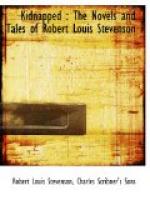But I had not time to be of help. The wrestler dropped at last; and Alan, leaping back to get his distance, ran upon the others like a bull, roaring as he went. They broke before him like water, turning, and running, and falling one against another in their haste. The sword in his hands flashed like quicksilver into the huddle of our fleeing enemies; and at every flash there came the scream of a man hurt. I was still thinking we were lost, when lo! they were all gone, and Alan was driving them along the deck as a sheep-dog chases sheep.
Yet he was no sooner out than he was back again, being as cautious as he was brave; and meanwhile the seamen continued running and crying out as if he was still behind them; and we heard them tumble one upon another into the forecastle, and clap-to the hatch upon the top.
The round-house was like a shambles; three were dead inside, another lay in his death agony across the threshold; and there were Alan and I victorious and unhurt.
He came up to me with open arms. “Come to my arms!” he cried, and embraced and kissed me hard upon both cheek. “David,” said he, “I love you like a brother. And O, man,” he cried in a kind of ecstasy, “am I no a bonny fighter?”
Thereupon he turned to the four enemies, passed his sword clean through each of them, and tumbled them out of doors one after the other. As he did so, he kept humming and singing and whistling to himself, like a man trying to recall an air; only what he was trying was to make one. All the while, the flush was in his face, and his eyes were as bright as a five-year-old child’s with a new toy. And presently he sat down upon the table, sword in hand; the air that he was making all the time began to run a little clearer, and then clearer still; and then out he burst with a great voice into a Gaelic song.
I have translated it here, not in verse (of which I have no skill) but at least in the king’s English.
He sang it often afterwards, and the thing became popular; so that I have, heard it, and had it explained to me, many’s the time.
“This is the song of the sword of Alan; The smith made it, The fire set it; Now it shines in the hand of Alan Breck.
“Their eyes were many and bright, Swift were they to behold, Many the hands they guided: The sword was alone.
“The dun deer troop over the hill, They are many, the hill is one; The dun deer vanish, The hill remains.
“Come to me from the hills of heather, Come from the isles of the sea. O far-beholding eagles, Here is your meat.”
Now this song which he made (both words and music) in the hour of our victory, is something less than just to me, who stood beside him in the tussle. Mr. Shuan and five more were either killed outright or thoroughly disabled; but of these, two fell by my hand, the two that came by the skylight. Four more were hurt, and of that number, one (and he not the least important) got his hurt from me. So that, altogether, I did my fair share both of the killing and the wounding, and might have claimed a place in Alan’s verses. But poets have to think upon their rhymes; and in good prose talk, Alan always did me more than justice.




